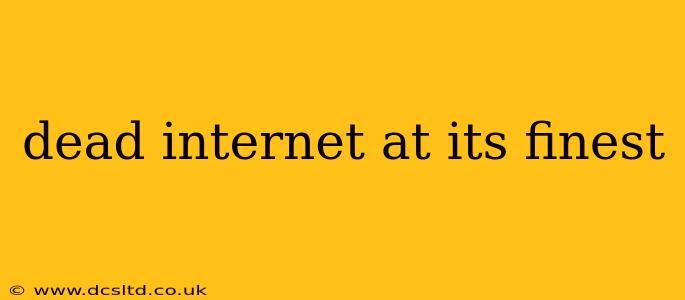Dead Internet Theories: Exploring the Memes and the Meaning Behind Them
The "dead internet" isn't a single event, but rather a recurring sentiment reflecting a perceived decline in online culture and experience. It's a nostalgic yearning for a simpler, arguably more authentic, internet. This feeling is often expressed through memes and discussions focusing on the shift from the early internet's raw, unfiltered nature to the more polished, corporate-influenced landscape we see today. This article explores the various facets of the "dead internet" meme, examining its origins, its different interpretations, and what it reveals about our changing relationship with the online world.
What is the "dead internet" referring to?
The "dead internet" generally refers to a perceived decline in the quality and authenticity of the internet experience. Many associate it with the rise of social media, corporate control over online spaces, and the loss of the quirky, unfiltered content that characterized the early days of the web. The "golden age" of the internet, often cited in these discussions, is a subjective period, generally encompassing the late 1990s and early 2000s. This was a time before the dominance of large social media platforms and the widespread adoption of mobile internet.
What are the key characteristics of the "dead internet"?
Nostalgia plays a significant role in the "dead internet" narrative. People often highlight several key characteristics associated with this idealized past:
-
Unfiltered Creativity: A sense of limitless creative expression, with less emphasis on strict moderation or corporate guidelines. This included things like early internet forums, user-created websites, and the overall chaotic nature of online content.
-
Stronger Sense of Community: A more close-knit feeling within online communities, characterized by a shared sense of discovery and experimentation. People felt more connected to others who shared similar interests.
-
Early Internet Aesthetics: A distinctive visual style, often characterized by simple HTML, low-resolution images, and a playful, amateurish aesthetic that was often part of the charm. GIFs, simple animations, and early internet humor were prominent.
-
Less Commercialization: A period where online spaces felt less saturated with advertising and corporate influence. Many see this as contributing to the perceived authenticity of the early internet.
Why do people feel the internet is "dead"?
Several factors contribute to the feeling that the internet is "dead" or has lost its former glory:
-
Rise of Social Media: The dominance of large social media platforms has centralized online interaction, leading to concerns about algorithm manipulation, data privacy, and the homogenization of content.
-
Increased Commercialization: The increasing prevalence of advertising and corporate influence has altered the online landscape, often seen as detracting from the organic, user-driven nature of the early internet.
-
Loss of Unique Content: The standardization of online platforms and content has led to a decline in the uniquely weird and wonderful content that once characterized the internet.
-
Changes in Online Communication: The shift from text-based communication to more image and video-centric formats is also cited by some as a contributing factor.
Is the internet really dead? Or is it just changing?
The "dead internet" is, ultimately, a matter of perspective. While the internet has undoubtedly changed significantly since its early days, the notion of it being "dead" is an oversimplification. The internet continues to evolve, offering new platforms, communities, and opportunities for creative expression. The sentiment reflects a longing for a simpler past, rather than a factual assessment of the internet's current state. It's more accurate to say the internet has matured and transformed, rather than perished. New platforms and subcultures continue to emerge, offering fresh ways for people to connect and create.
How can I find remnants of the "old internet"?
While the "old internet" is largely gone, remnants still exist. You can find examples by:
- Exploring Internet Archives: Websites like the Wayback Machine offer snapshots of websites from the past, allowing you to experience the early internet firsthand.
- Seeking out niche online communities: Smaller, less mainstream online communities often retain aspects of the early internet's unfiltered, creative spirit.
- Looking for early internet artifacts: Many examples of early internet art, games, and culture are still available online, offering a glimpse into the past.
The "dead internet" meme serves as a potent reminder of the speed and scale of technological change, and how our online experiences are constantly evolving. While the nostalgic yearning for a simpler time is understandable, embracing the ever-changing nature of the internet allows us to discover new and exciting aspects of online culture and community.
